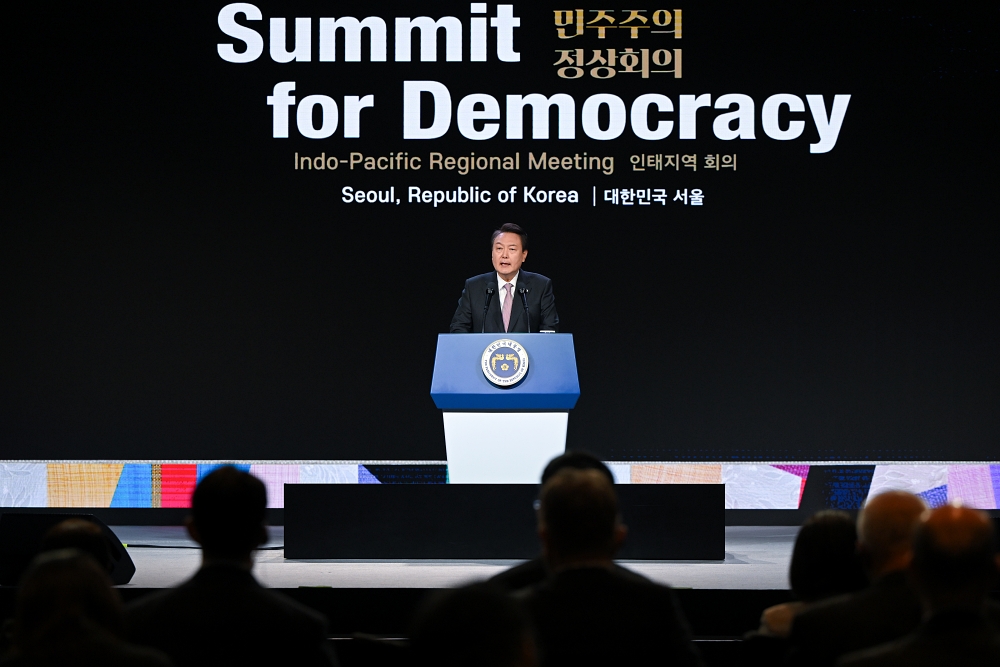-
About the Ministry
About the Ministry
- Press
- Countries & Regions
- Policy Information
- Life In Korea
Ministry News
- Notices
- Ministry News
- Press Releases
- Press Briefings
- Speeches & Published Materials
- Newsletter Service
- Diplomatic White Paper
Indo-Pacific Regional Meeting of 2nd Summit for Democracy Takes Place
- Date
- 2023-04-10
- hit
- 13927

1. The Korean government hosted the ministerial Indo-Pacific Regional Meeting of the second Summit for Democracy on “Challenges and Progress in Addressing Corruption” in Seoul on March 30, after it co-hosted the virtual leaders' plenary on March 29 along with the United States, the Netherlands, Costa Rica and Zambia.
2. The Indo-Pacific Regional Meeting brought together government delegates from Indo-Pacific countries, including the Trade Representative of the U.S. (USTR), the Summit’s leading host, and members of international organizations, academic circles and civil societies related to anti-corruption. The participating Indo-Pacific countries adopted the “Seoul Declaration on Challenges and Progress in Addressing Corruption,” reaffirming the importance of promoting democracy and of the need to combat corruption.
3. The Indo-Pacific Regional Meeting kicked off with welcoming remarks by President Yoon Suk Yeol followed by remarks by government delegates from other participating countries.
4. President Yoon Suk Yeol called the Meeting an opportunity to affirm the willingness to implement the “Strategy for a Free, Peaceful, and Prosperous Indo-Pacific Region,” which the Korean government announced last December, and attached great significance to the Meeting as a chance for Indo-Pacific countries to get together to reaffirm their commitment to the protection of democracy and to set milestones in that regard.
5. President Yoon noted that Korea has strengthened its capability to respond to corruption through measures, including improving anti-corruption law and setting up a digital criminal justice system. Calling the combat against corruption at the international level important, he stated that he expects the Seoul Declaration adopted on the day to provide guidance moving forward.
6. President Yoon stated that, to repay the international community for its support for Korea's liberal democracy and prosperity, Korea will implement development cooperation projects worth US$100 million over next three years in the areas that can contribute to the promotion of democracy, such as the e-government system, digital transformation, strengthening technological capabilities, transparency, and anti-corruption efforts, all toward “a shared vision for democracy and prosperity.”
7. President Yoon added that Korea will carry out a “democracy promotion for future generations” program in the form of a track 1.5 youth forum where the public and the private participate together, in order to help young adults in the Indo-Pacific contribute to freedom and prosperity.

8. In his opening remarks, Minister of Foreign Affairs Park Jin stated that, amid the global retreat of democracy, the international community should use the Summit for Democracy as an opportunity to cooperate to protect democratic principles. He further stressed that Korea’s own path to democracy stands as a living testament to the truth that democracy remains the most effective means to freedom, peace and prosperity.
9. Foreign Minister Park pointed out that corruption poses a threat to democracy, as it undermines public trust and impedes progress toward the Sustainable Development Goals (SDGs); explained that the Ministers of the Indo-Pacific region adopted the “Seoul Declaration on Challenges and Progress in Addressing Corruption” in their resolve to prioritize the fight against corruption; and expressed hope that the Regional Meeting would serve as a catalyst for greater cooperation in advancing democracy across the Indo-Pacific region and beyond.
10. Other government officials participating in the opening ceremony, including USTR Katherine Tai, Minister for Foreign Affairs of Japan Hayashi Yoshimasa, Minister for Foreign Affairs of Australia Penny Wong, Minister for Foreign Affairs of Indonesia Retno L.P. Marsudi, and Minister for Justice, Communication and Foreign Affairs of Tuvalu Simon Kofe, agreed on the importance of the fight against corruption in promoting democracy, shared their respective countries’ efforts in that regard, and put forward ways for further cooperation.
11. After the opening ceremony, the Regional Meeting consisted of four panel sessions on (1) International Cooperation for Anti-Corruption; (2) Non-governmental Stakeholders for Anti-Corruption (3) Technology and Anti-corruption and (4) Financial Transparency and Integrity.
° Session I on “International Cooperation for Anti-Corruption” covered cooperation in information-sharing and monitoring that is essential to the interconnected international community in the combat against corruption. The participants drew a common understanding that it is important to work together through various frameworks, such as the United Nations Convention against Corruption (UNCAC) and the Financial Action Task Force (FATF).
° In session 2 on “Non-governmental Stakeholders for Anti-Corruption,” the participants discussed possible cooperation and connection among civil societies for anti-corruption work, such as putting forward legislation and policy suggestions, keeping an eye on the government and offering advice to victims. They stressed that active participation of the civil society and private-sector activists is essential for maintaining strong democracy and effectively carrying out anti-corruption work.
° In session 3 on “Technology and Anti-corruption,” the participants shed light on the role of digital innovation and technologies in addressing corruption and enhancing transparency from diverse perspectives and discussed challenges posed by new technologies.
° In session 4 on “Financial Transparency and Integrity,” the participants shared the view that financial transparency and the eradication of illegal fundraising activities is necessary for preventing and detecting corruption; shared successful cases in enhancing the transparency of beneficial ownership of assets; and discussed relevant challenges.
12. In conjunction with the Indo-Pacific Regional Meeting, a side event was held under the theme of “Youth Resilience against Corruption—Spearheading Change,” led by young, future leaders of democracy. The event consisted of young adults’ panel discussion on innovative ways to fight corruption and an awards ceremony of a video and arts contest for young adults.
13. The Korean government will use the Indo-Pacific Regional Meeting of the second Summit for Democracy as an opportunity to step up its efforts to contribute to the promotion of democracy, and will prepare for the third Summit as its host.




